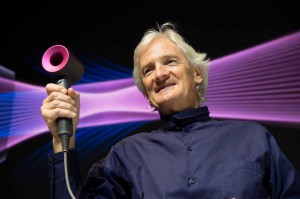
James Dyson, whose company is best known for making vacuum cleaners and hair dryers, is planning to produce an electric vehicle by 2020.
The man who changed the way vacuum cleaners work plans to spend $2.7 billion to do the same in the automotive industry. James Dyson, the creator of the Dyson vacuum, said he’ll bring an electric vehicle to market by 2020.
Dyson said he’s got a team of more than 400 employees working on the project, and has for the last 2.5 years. His vehicle already starts with a major difference from current EVs — Dyson’s car will utilize a solid-state battery instead of lithium ions.
He notes that his company’s expertise in solid-state battery technology and electric motors prevalent in his vacuum cleaners, bladeless fans and air purifiers is excellent preparation for producing an EV with an as-yet-viable battery.
“Battery technology is very important to Dyson, electric motors are very important to Dyson, environmental control is very important to us,” Dyson told Reuters. “I have been developing these technologies consistently because I could see that one day we could do a car.”
(Porsche’s Mission E compounds problems for Tesla, could cripple the Model S. For the story, Click Here.)
At this point, the car is missing a few important things:
- a design
- a chassis
- a manufacturing plant
- a name
The company is looking for a home, he noted, adding it will likely be near wherever the suppliers for the new machine will be. He also said that the exterior design would be different than other EVs on the road, although it will not be a sports car.
Additionally, if you’re looking for a bargain vehicle, you’ll be disappointed as he said it will “not be a very cheap car.” He didn’t eliminate any potential markets for the vehicle, but he did note that “we see a very large market for this car in the Far East.”
(Click Here for more about China’s possible change in foreign EV company ownership rules.)
However, Dyson does have one clear idea about his venture: he’s not working with a large automaker. The 71-year-old executive had a bad experience with automakers when he approached them about an idea he had for vehicle exhaust using the same cyclonic technology used in his vacuum cleaners nearly 30 years ago.
“We are not a johnny-come-lately onto the scene of electric cars,” he told Reuters. “It has been my ambition since 1998 when I was rejected by the industry, which has happily gone on making polluting diesel engines, and governments have gone on allowing it.”
Dyson revealed the project only because it was getting increasingly more difficult to recruit new employees for the project without revealing the nature of the project. He told the 1,000-plus employees in his company via email that the project was a go, and his message also reflected his inherent distrust of the industry.
(To see more about Toyota revealing its electrification strategy next year, Click Here.)
“Competition for new technology in the automotive industry is fierce and we must do everything we can to keep the specifics of our vehicle confidential,” he said in the email.

His batteries were developed at the University of Michigan.